Nicola Griffith's Blog, page 68
February 7, 2016
Letters to Tiptree on sale for a dollar so you can read and nominate it for a Hugo Award
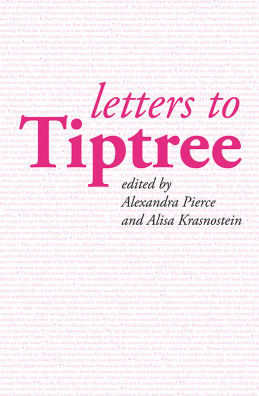
Nominations are now open for the Hugo Awards. The nomination period is open until March 31.1
For Best Related Work2 I’d like to point you to Letters to Tiptree, edited by Alisa Krasnostein and Alexandra Pierce. It contains letters from 35 writers, editors, critics and fans (including me) who have been influenced by the work of Dr Alice Sheldon (a/k/a James Tiptree, Jr., a/k/a Raccoona Sheldon). On top of those essays (which are astonishing in and of themselves) there’s bonus reprint material:
archived letters from Ursula K. Le Guin, Joanna Russ and James Tiptree Jr./Alice Sheldon (and frankly the editors deserve a Hugo simply for getting those permissions; if you’ve never dealt with a literary estate before let me tell you, it requires heroic determination)
excerpts from The Secret Feminist Cabal: A Cultural History of Science Fiction Feminisms by Helen Merrick
excerpt from Battle of the Sexes in Science Fiction by Justine Larbalestier
essay by Michael Swanwick
It’s a great collection and until March 31 you can buy the ebook for just 99c from Amazon, Weightless, and other retailers. One dollar. That’s an amazing price (amazing price for any book, but for this one it’s a absolute steal).
Three of the essays are available for free:
My contribution, “The Women You Didn’t See,” at the Los Angeles Review of Books
Gwyneth Jones’s “Dear Dr Sheldon” at Strange Horizons
Brit Mandelo’s essay, (doesn’t seem to have a title) at Tor.com
Go take a look. And go vote.
1 To be presented at MidAmeriConII, the 74th Worldcon, August 17-21, 2016 in Kansas City MO if you have an attending or supporting membership for MidAmeriConII, Sasquan (the 2015 Worldcon), or Worldcon 75 (the 2017 Worldcon) by January 31, 2015. The nomination period closes March 31, 2016 at at 11:59pm Pacific Daylight Time. More information on the Hugo Awards, and how to submit a nominating ballot, can be found at the MidAmeriConII site.
2 Hugo Award categories








February 3, 2016
Bare Hands
I got this yesterday: video put together by Lou Duffy-Howard, bassist extraordinaire, for “Bare Hands,” a track recorded by Janes Plane, the band I was in, in 1982. I was 21.
Music and lyrics © Janes Plane (Nicola Griffith, Jane Lawrence, Lou Duffy-Howard, Carol Holmes, Jane Hicks), 1982.








February 2, 2016
Films and TV about women don’t win awards: some data
Films and TV shows about women do not win prestigious awards. Screen stories about women are not being told.
I analysed the last 25 years’ results for the Academy of Motion Picture Arts and Sciences awards for Best Picture (Oscar™), and for the Television Academy’s Prime-Time Emmy for Outstanding Drama Series (Emmy™).1 The data show that tv shows about women never win, and that films about women almost never win. In addition, the central characters of award-winning films are overwhelmingly white.2
I also looked at the proportion of male and female writers who won the Academy Award for Best Original Screenplay and Best Adapted Screenplay. In both cases, the number of men far outweighs the number of women.3
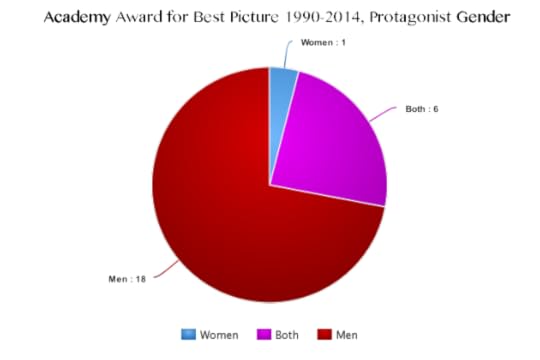
In the last 25 years exactly one film primarily about women, Chicago, has won the Academy Award for Best Picture. We are 51% of the world; our stories win 4% of the Best Picture Oscar. Six films, or 24%, won that are about both women and men. But most of those (for example Million Dollar Baby, Shakespeare in Love, and Silence of the Lambs) focused on how hard it is to be a woman in a man’s world. In other words, those women were not human beings but those of a lesser species, female people who suffer in a man’s world. This Othering applies, too, with regard to race in films.
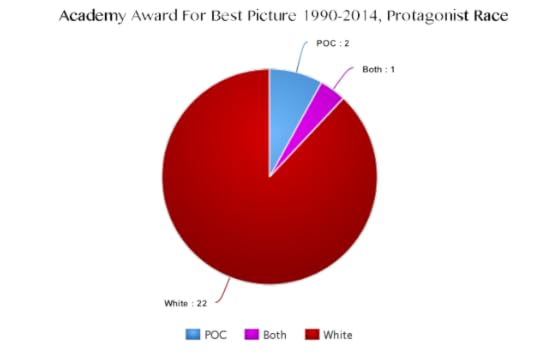
Only two films about people of colour, Slumdog Millionaire and 12 Years a Slave have won the Best Picture award. That’s 8%—twice as many as films about women but still a pitiful proportion. Note, too, how few films are about both people of colour and white people. Why is that?4
There was a noticeable difference between Adapted and Original Screenplay protagonists’ gender.
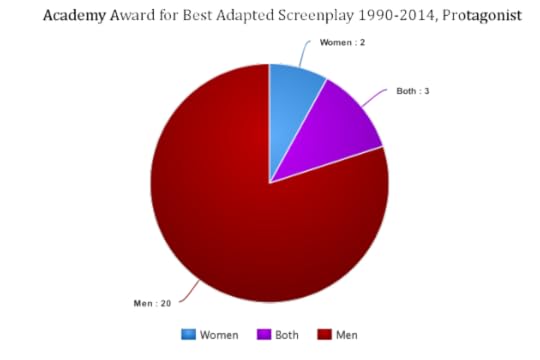
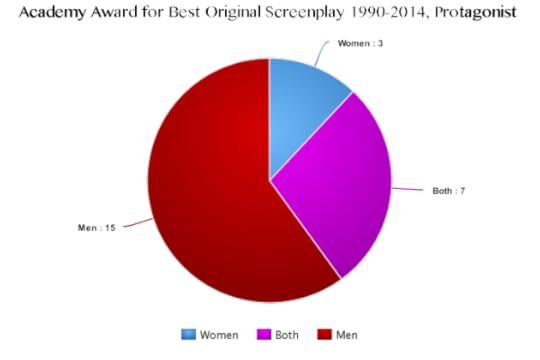
Fewer adapted stories adapted for the screen are about women than are original scripts: 8% about women, 12% about both, and a whopping 80% about men versus 12%, 28%, and 60% for originals. Why? I don’t know. I took a look at who wrote those scripts.
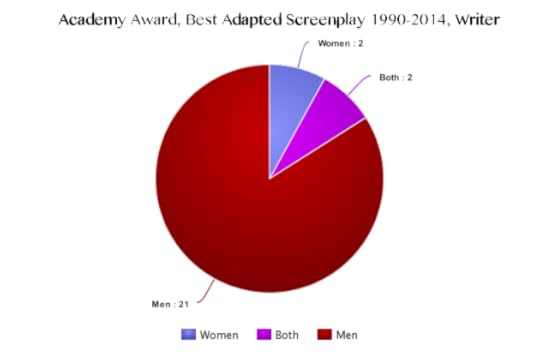
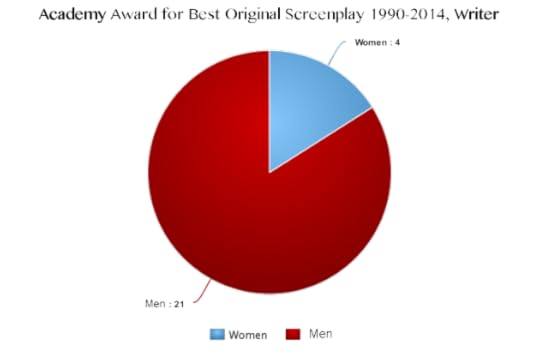
There’s a difference: 16% of the winning original scripts were written solely by women, twice as many as for adapted stories. It’s still a meagre proportion.
And now we come to TV. This is what set me off in the first place: I could find no decent TV drama about women, women as human beings. So I counted Emmys for Outstanding Drama Series.
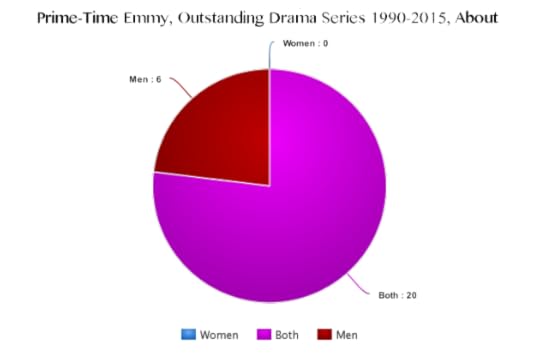
There was not one. None. Zero. In the last quarter of a century not one single Emmy for Outstanding Drama has been won by a series primarily about women. And this chart does not tell the whole story. Many of the series I categorised as Both are ensemble casts heavily weighted towards male characters. Take, for example, Law and Order and Mad Men. Between them I counted 3 women and 8 men as protagonists. That is, 27%.5 I haven’t counted everything but if this ratio held true of those 77% of shows that could be classified as about both, only about 20% of TV protagonists are women.
So next time you turn on the TV and nothing excites you, you’re not crazy, you’re not wrong. Women’s stories are not there. Our stories are not being told.
1 I used Wikipedia lists of Best Picture winners and Outstanding Drama winners. I assessed the sex and race of the star. If there were co-stars of both sexes I used Academy category nominations (Best Actor/Actress, Supporting Actor/Actress) as the deciding factor. So, for example, I categorised Million Dollar Baby and Silence of the Lambs as Both. In addition, I used one-sheet visuals to check race for Best Picture characters and to count the gender balance on ensemble TV shows. I’d be surprised if this method yielded total accuracy. Also, the charts are a bit messy because I did this piecemeal. (This is more a proof-of-concept than a serious study, one of the reasons I looked at so few awards.) Nonetheless, I welcome corrections.
2 As for other marginalised groups—characters with different physical abilities, religious affiliation, sexuality, or gender presentation—I didn’t even bother counting. Nor did I count race for TV shows. But I hope someone else will.
3 I did not count the producers or show-runners or writers of the TV series. I did not look at the race of writers. Again, I hope someone will.
4 This, sadly, is a rhetorical question. According to Roxanne Gay in the New York Times, in 2012 94% of the Academy were white and 77% were male. In 2011, 10.5% of lead actors were people of colour. Even fewer were written by POC: 7.6%.
5 27% is what I’m coming to think of as the classic Sexist Ratio. It’s amazing how it applies to so many fields.








February 1, 2016
Women characters in film and tv should do more than struggle
I’m tired of my screen choices being to watch a rollercoaster ride about men, or an angsty torment about a woman struggling because she is a woman. I want to see some fabulously exciting screen stories about women who are simply people.
Women do more, are more, than suffering. We do more than have babies/yearn to have babies/fail to have babies. We are more than victims to be raped or battered or fought over. We do more than worry about finding a spouse or making the wedding perfect. We do more than fret about how to be better women, or how to defy society’s expectations. We are most certainly more than characters who wilt under omnipresent sexual threat.
Women can be heroes; we can rescue others. And by others I mean people, strangers, not just those whom we have societal permission to protect: children, little sisters, frail mothers. Women are perfectly capable of saving the world for no other reason than that we can. We don’t have to struggle with inner demons or Secrets from the Past. We don’t have to hide our superpowers because to be seen as helpless is to be seen as normal. We can do more than perform our gender so perfectly that no one suspects our competence. We are more, we do more than rant and rage at unequal treatment.
Women are people, real human beings—with and without friends, with and without family, with and without personal problems. I want to see film and tv reflect that.
I want to see women save the world—from the asteroid, the virus, the aliens, the terrorists. I want to see women winning—the medal, the office, the job. I want to see women creating, or destroying, or being fools, but as ourselves, as people, human beings. I want to see women who are gods and superheroes, criminal geniuses or musical geniuses, mountain climbers and clowns.
I want to see women burning bright. And I want to see a lot of us: fifty-one percent. Fifty-one percent of the janitors and soldiers, dentists and bricklayers, parents and accountants. Fifty-one percent of the politicians and CEOs, teachers and pupils. Fifty-one percent of protagonists and antagonists, ensemble players and extras. Women make up more than half the population. But our stories are not being told on screen. And when they are, they do not win big awards such as Best Picture or Outstanding Drama.
Tomorrow I’ll post the charts and numbers. Spoiler: it’s worse than you think.








January 21, 2016
38% of English ancestry derived from Anglo-Saxon migration
Over on Gemæcce, my research blog, I’ve just posted “38% of English ancestry derived from Anglo-Saxon migration,” a piece about the new study of English ancestry in Nature Communications. The study has interesting implications. It’s made me more determined than ever to organise my thoughts on climate change, immigration, disease, and culture collapse.
Stay tuned.








January 8, 2016
Experimenting with workflow
I’m working on two big projects and am experimenting with workflow: timing, choices, priorities. In essence this means two things: writing in the morning instead of the afternoon, and hauling up the internet portcullis for only a few hours after lunch.
The result will, I hope, be less distraction, less fatigue, and more progress. I’m guessing that how it will look from the outside is chunks of ringing silence followed by intense blather. It will probably mean that if you send me email my response will be delayed 24 hours (sometimes more). Not being connected means just that: turning off everything but my landline and desktop machine.
Freedom, the app, will keep me insulated from distraction while at the keyboard. I’ve been using it during the day for years (it works; I recommend it highly) so the biggest change for me will be staying off the internet at night. I’ve been doing it two days so far—turning me phone off and leaving my iPad in another room—and am finding the sudden space in my head startling. This could get interesting.








January 7, 2016
Do you recognise me 35 years ago?
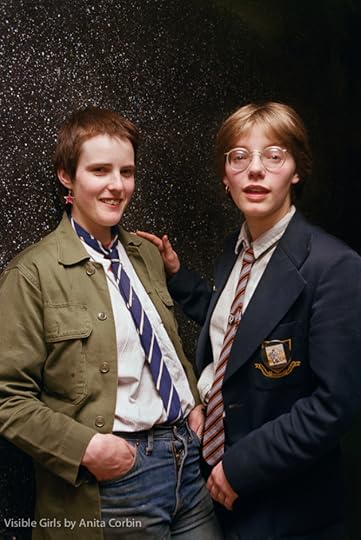
Carol and Nicola, The Tabernacle, Notting Hill Gate, April 1981. Photo by Anita Corbin.
A photo of me taken when I was 20 is in the news again—this time The New York Times:
Nicola Griffith, pictured above right, is now a successful novelist, married and living in Seattle. “Seeing that photo again, taken nearly 35 years ago, gave me a vertiginous moment, like leaning over the edge of what-could-have-been,” wrote Griffith, who described her subculture in those days as “party-through-the-revolution lesbian feminist underclass.”
See also the The Daily Mail. It’s turning into the photo that wouldn’t die. I wrote about it early last year:
In the spring of 1981, when I was 20, I went down to London with my partner, Carol (we lived together for ten years before I moved to the US to be with Kelley), for the first UK Lesbian Conference. It was academic and political. Carol and I were there, though, to party. And at the social we got seriously wasted on magic mushrooms. If I recall correctly (and that’s a big if—in those days I took a lot) Carol began to freak out a bit—those of you who are familiar with the psilocybin cycle know that this can happen; it generally doesn’t last long—and I led her to a dark wall and put my arm around her to shelter her from the worst of the noise and light until she found her equilibrium. Just as she was breathing and calming down (but was not quite out of the woods) a woman with a camera appeared and asked if she could take our picture. I was a bit fretful behind my euphoria—mushrooms are like that—worried about Carol, feeling super-protective, and was about to say no when Carol beamed and said, “Yeah, let’s do it!”
At which point the photographer, Anita, took the picture…
One thing I’m struck by this time is those glasses. I’m now so used to having bionic eyes I can barely remember what it was like to be so myopic. Having said that, this week I finally threw out the last of my contact lens solution which I’d squirrelled away against the apocalypse.
Oddly, I both remember the moment very well and feel as though it was another lifetime. If I didn’t already know it was me would I recognise myself? I don’t know.
What do you think. Would you know it was me?








January 1, 2016
2016
Every New Year’s Eve Kelley and I do the same thing: sit before the fire with Champagne while we eat delicious things and talk. We talk about the year that’s passed and the year to come. We mull the things we’ve learnt—the hard things and fabulous things, the amazing surprises and the tedious repeats—and then move on to talking about how we see the year to come.
2016 will, for me, be the Year of Work. I have Menewood to write, plus a secret mega-project that may or may not be something I’ll talk about anytime soon—or ever, if things don’t pan out—but will be a serious shit-ton of work. Also I will be focusing on my health. By that I mean, mostly, physical therapy; twice a week. PT is hard work. One hour of PT entails 5 hours or so of lost time (travel, the exercise, and recovery time). So twice a week is a big chunk of my physical and mental bandwidth. But it’s worth it. MS likes to steal physical function when I’m not looking; it feels like rusting up. Think of PT as my anti-rust coating. There will still be rust—MS is relentless that way—but it will accumulate less quickly.
2016 will also be the Year of No Travel. I’ve reached the point where every time I see a plane I chortle and think, “I don’t have to get on one of those fuckers anytime soon!” So the plan is not to get near a plane this year. We foresee one possible exception: OtherLife. At some point it will be through post-production and then, with luck, at a festival. We don’t know when or where (or even if) but we most definitely want to be there.
Two big projects instead of a myriad little ones, plus the lack of travel, mean I should get more done and still have time for the joyful things of life. 2016 will be a good year. For all of us, I hope.








December 24, 2015
Moments from 2015
A short assortment of moments, posts or events that I found interesting this year (mostly on the blog, but some on Instagram or another venue):
Books about women don’t win awards: some data | Update on Literary Prize Data group I had no idea that a short post about gender bias in books awards would take up so much of my time this year. But it did.
Readercon Guest of Honour Report I had a lovely time being GoH at Readercon, the venerable East Coast literary fantastic literature convention. And while I was there I talked about the Mother in Speculative Fiction. More on that next year.
27 Years | Marriage Equality Will Change the World This is a subject for which I could list many posts but the conequence of SCOTUS making a habit of announcing these decisions on June 26? Now I’ll expect something equally exciting from them every year. Hey, it’s my right!
My father at 90 We went to the UK for a couple of weeks this autumn for my father’s 90th birthday. It was whirlwind trip, with lots of work before and after, so I didn’t blog about it. But it was wonderful. One the day of his birthday: five generations of family in one room. Pretty amazing. Also, pretty Guinness-soaked…
Kelley’s film OtherLife now shooting in Perth This is something Kelley has been aiming for for nine years. We haven’t talked about it much but, Holy shit! It’s happening!!
New, shiny website and blog I’ve been meaning to do this for at least a dozen years. But I kept wanting a perfect site, I mean perfect. But perfect is the enemy of done. And eventually I said, Ah fuck it… There’s a new version, too, of Gemæcce, my research blog.
The women you didn’t see The first in what I think will become a series of Letters to Dead People, essays that are part literary and/or cultural criticism and part personal.
My story, mystery The second of my Letters to Dead People.
Subject not object Every now and again I finally figure out a way to say something that’s been bugging me for years…
Ex Machina review | Manly War Goats Two film reviews. Not something I do often but it exercises a different muscle. Perhaps I’ll do one for The Force Awakens. I mean, how did BB-8 get back up those steps??








December 18, 2015
Darth doesn’t like Christmas trees…
I can’t wait to see The Force Awakens except, well, I have to. We aren’t seeing it til next week. But here, in anticipation, is the most famous mouth breather of all time getting irritated by our inoffensive Christmas tree…











